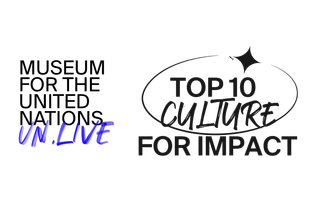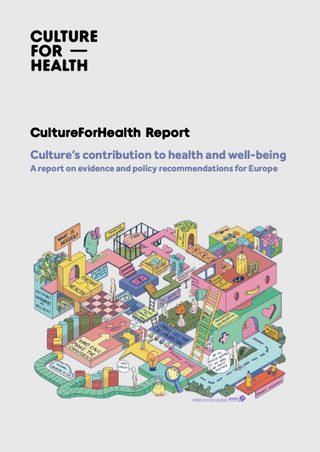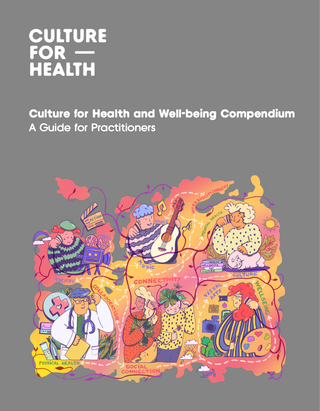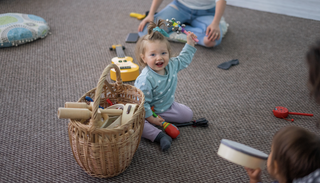Top 10 Culture for Impact 2023

Museum for the UN Live
UN Live Culture for Impact List 2023
Key Research Questions
- What are the considerations for implementing successful arts-based interventions in new cultural contexts?
Download

Culture for Health Report
8 Culture for Health report

WHO EUROPE REGION: HEALTH EVIDENCE NETWORK SYNTHESIS REPORT
A scoping Review

Culture for Health and Well-being Compendium
A Guide for Practitioners
Research Paper
National Library of Medicane
Video

Centrul Cultural Clujean
Music & Motherhood
Background
The Music and Motherhood intervention was originally developed and evaluated in the UK by the Centre for Performance Science (a partnership between the Royal College of Music and Imperial College London) from 2015 to 2017. The intervention has since been adapted, delivered, and scaled up in the UK as the Breathe Melodies for Mums programme, by the non-profit Breathe Arts Health Research social enterprise, and included in the large-scale SHAPER-RCT on scaling up and embedding arts interventions into clinical pathways.
Postpartum depression (PPD) affects about one in seven women globally. There is a long history showing the benefits of singing for maternal mental health, and promising research has identified the clinical effectiveness of group singing and play. This study explored how Music and Motherhood was adapted to new cultural contexts, with a view to providing support and guidance on future implementation and scale-up of arts interventions.
Research Protocol
The Music and Motherhood implementation project explored the adaptation of the Music and Motherhood intervention to the new contexts of five cities in three countries: Silkeborg (Denmark); Turin, Este, and Rome (Italy); and Cluj-Napoca (Romania).
A research component was designed to explore the feasibility and evaluate the perceived impact of the intervention by participating mothers. Initial conversations with interested parties began in March 2021, and data were collected until summer 2023. Mothers in the participating cities joined for ten weeks of singing classes, during which they answered questions on their PPD symptomatology, perceived social support, and mental wellbeing in weeks 0, 6, and ten. Mothers were also invited to discuss their experiences of the sessions in focus groups. In addition, selected mothers and those involved in implementing the project participated in interviews to evaluate the feasibility of adapting the group singing sessions to different cultural contexts.
Early qualitative findings have been published, including a study protocol of the 10-week singing intervention model and a research report outlining the key factors that influenced the adaptation and implementation of the singing programme. A toolkit outlining the adaptation and implementation of arts and health interventions in new contexts is forthcoming.
Due to the sample size these results are not generalizable, but do indicate that the project broadly had a positive impact on participating mothers across the three countries. Further data on implementation, feasibility, and impact are forthcoming.
Provisional Data
Throughout the project three measures were used to determine the impact on participating mothers:
- The Edinburgh Postnatal Depression Score (EPDS), to measure symptoms associated with PPD
- The Multidimensional Scale of Perceived Social Support (MSPSS), to measure the perceived adequacy of social support from family, friends, and significant others
- The WHO-5 Well-Being Index, to measure the level of subjective wellbeing over the previous two weeks
Due to our sample size these results are not generalisable, but do indicate that the project did broadly have a positive impact on participating mothers across the three countries.

Further data on implementation, feasibility and impact is forthcoming, and will be uploaded on this page in due course.
Project Film
Trailer
The Music & Motherhood Project
Group Singing to support new mothers experiencing postpartum depression.
Locations: Denmark, Italy, and Romania
Countries
Denmark
In Denmark, 11 mothers participated in the project in total. Mothers attended sessions on Thursday mornings.
Adaptation
Mothers shared their favourite songs to learn, or songs believed to have a suitable mood were selected, for example those that encourage positivity or build hope or feelings of strength. Session techniques included breathing exercises, call and response, improvisation, mirroring, and repetition.
The session singing lead was a conservatory-trained professional singer and singing teacher with experience of running singing courses for expectant mothers. In addition, a psychologist was on call if needed.
The project was run by Den Kreative Skole – an art school in Silkeborg. The school had previously delivered antenatal singing classes.
Systems & Structures
Within the Danish health system, mothers and babies receive support from dedicated nurses who are able to identify the symptoms of PPD. However, it was reported that within the Danish health system more generally, mothers found it shameful at times to not ‘enjoy’ being a mother.
Referrals to the Music and Motherhood programme came through the health service. Health nurses locally were made aware of the programme, and direct referral (instead of social media recruitment, for example) was deemed the most effective way to reach mothers who would benefit most from the project.
Once referred and successfully entered into the programme, mothers attended sessions in a music room at Den Kreative Skole. The room was furnished with chairs and cushions arranged in a circle on the carpeted floor, as well as blankets for children. The room, designed for acoustic music and singing, received plenty of air and natural light.
Italy
The Music and Motherhood programme was implemented in three cities in Italy: Rome, Turin, and Este (Padua). A total of 23 mothers attended.
Adaptation
PPD group singing leads chose songs based on their perceived suitability for mothers and babies. These included lullabies, uplifting songs, music in different languages from around the world, and music arrangements. Sessions started with breathing exercises, movement, soundscapes played through a speaker for relaxation, and warm-up stretches.
Each session was run by a professional singing lead with experience in leading singing groups for new mothers and/or children in the first months of life. The singing leads from all three cities met throughout the programme to share their experiences. For additional support, one group included a volunteer and a professional health service educator; another group included a psychologist, a midwife and a volunteer acting as a link worker; and a third group had two midwives in attendance to provide support.
Sessions were run by family care centres at three local health units, while central coordination was provided by the Italian National Institute of Health (L'Istituto Superiore di Sanità). Recruitment was done by direct referral from health system practitioners.
Systems & Structures
Family care centres are Italy’s primary national health service dedicated to pregnancy and postnatal assistance. These centres take a proactive and holistic approach to care provision.
Romania
In Romania, the implementation project included two series of sessions: those during which Romanian was spoken, and those during which Hungarian was spoken. A total of 13 mothers attended, meeting on either Monday mornings or Tuesday afternoons.
Adaptation
Musical content during the sessions included authentic Romanian folklore, classical music arrangements, film soundtracks, folk songs, lullabies, music in different languages from around the world, and pop songs. The music for the sessions was often picked by requests from the mothers. Singing was complemented by playing small instruments. Breathing exercises also played a role.
The sessions were run by professional singing leads, one for each group. In addition to singing leads, volunteers attended the sessions to provide support, including playing with mothers’ older children.
Systems & Structures
The Romanian health system has limited mental health support beyond clinical care (e.g. psychiatry). In addition, significant stigma is attached to accessing services for mental health in general, including for PPD. Referral to the project took place through promotion by local arts, NGO, and health organizations, and recruitment used social media.
The project was run by the Cluj Cultural Centre, a cultural centre dedicated to the performing arts. The Cluj Cultural Centre is experienced in implementing community arts activities and interventions, making it an effective partner, especially within the health system context in Romania. Running sessions in the community, rather than in a healthcare setting, helped mitigate stigma-related access considerations for mothers.

Photo: Ioana Ofelia, Cluj Cultural Centre

Photo: Ioana Ofelia, Cluj Cultural Centre
Next Case Study

Yazidi Cultural Archives
The Yazidi Cultural Archives project aimed to improve the mental health of female Yazidi survivors through participation in a series of artist-led workshops and a multi-media digital archive of Yazidi cultural heritage at risk.
View Case Study





























